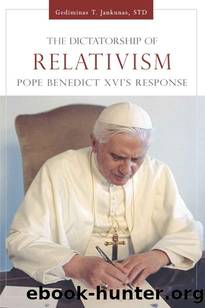Dictatorship of Relativism, The: Pope Benedict XVI's Response by Jankunas Gediminas T

Author:Jankunas, Gediminas T. [Jankunas, Gediminas T.]
Language: eng
Format: epub
Tags: ebook, book
Publisher: ST PAULS / Alba House
Published: 2011-02-04T05:00:00+00:00
4. The Dictatorship of Relativism
As previously stated, the Pro Eligendo Romano Pontifice homily publicized the dangers of relativism to a worldwide audience. David Bloor observes: âCardinal Ratzinger may have provided the best publicized denunciation of relativism in recent times, but his is only one of many, lesser condemnations.â682 It is worthwhile to have a closer look at what was said in the homily regarding this topic. Ratzinger began by reaffirming Christâs saving role in this world, presenting him not just as the announcer of Godâs mercy to all, but as being that mercy himself in his own person. Therefore, âencountering Christ means encountering the mercy of God.â683 Once again, we are reminded that faith is not about encountering or choosing certain ideas, but involves the encounter with the real person of Jesus Christ, the living God, in whom all that matters for people to know and to believe is embodied.
Cardinal Ratzinger was in no way naïve when he mentioned evil in his homily. He spoke of Godâs divine mercy as putting a limit on evil ruling this world: âChristâs mercy is not a cheap grace; it does not presume a trivialization of evil.â684 Addressing the always-burning issue of theodicy, the existence of evil is a way to keep people humble and open to Godâs care and love. However, because Jesus died on the Cross and rose to life, evil does not have the final word and therefore our journey through this valley of tears is filled with hope.685 Certainly, the idea of this world being a place of tears disquiets modern thinkers, but on further self-reflective introspection, one comes to the realization that this is not oneâs true home. Man is just a homo viator in this world and not its permanent citizen.
Cardinal Ratzinger continued his homily by quoting St. Paul and what it means to be an infant in faith. It means to be âtossed by waves and swept along by every wind of teaching arising from human trickery (Eph 4:14).â686 This passage is relevant today, for it points out how relativism first originates in human trickery, and thus becomes a product of oneâs own making, which reflects infantilism found in oneâs faith.687 The following passage by Ratzinger gives a brief and accurate summary of what relativism is, where it comes from, and what it actually does in the contemporary world:
How many winds of doctrine have we known in recent decades, how many ideological currents, how many ways of thinking? The small boat of the thought of many Christians has often been tossed about by these waves â flung from one extreme to another: from Marxism to liberalism, even to libertinism; from collectivism to radical individualism; from atheism to a vague religious mysticism; from agnosticism to syncretism and so forth. Every day new sects are created and what St. Paul says about human trickery comes true, with cunning that tries to draw those into error (cf. Eph 4:14). Today, having a clear faith based on the Creed of the Church is often labeled as fundamentalism.
Download
This site does not store any files on its server. We only index and link to content provided by other sites. Please contact the content providers to delete copyright contents if any and email us, we'll remove relevant links or contents immediately.
Resisting Happiness by Matthew Kelly(3337)
The Social Psychology of Inequality by Unknown(3018)
Day by Elie Wiesel(2781)
Designing Your Life by Bill Burnett(2740)
The Giving Tree by Shel Silverstein(2336)
Human Design by Chetan Parkyn(2068)
The Supreme Gift by Paulo Coelho(1962)
Angels of God: The Bible, the Church and the Heavenly Hosts by Mike Aquilina(1957)
Jesus of Nazareth by Joseph Ratzinger(1811)
Hostage to the Devil by Malachi Martin(1800)
Augustine: Conversions to Confessions by Robin Lane Fox(1769)
7 Secrets of Divine Mercy by Vinny Flynn(1741)
Dark Mysteries of the Vatican by H. Paul Jeffers(1715)
The Vatican Pimpernel by Brian Fleming(1699)
St. Thomas Aquinas by G. K. Chesterton(1632)
Saints & Angels by Doreen Virtue(1603)
The Ratline by Philippe Sands(1571)
My Daily Catholic Bible, NABRE by Thigpen Edited by Dr. Paul(1498)
Called to Life by Jacques Philippe(1475)
